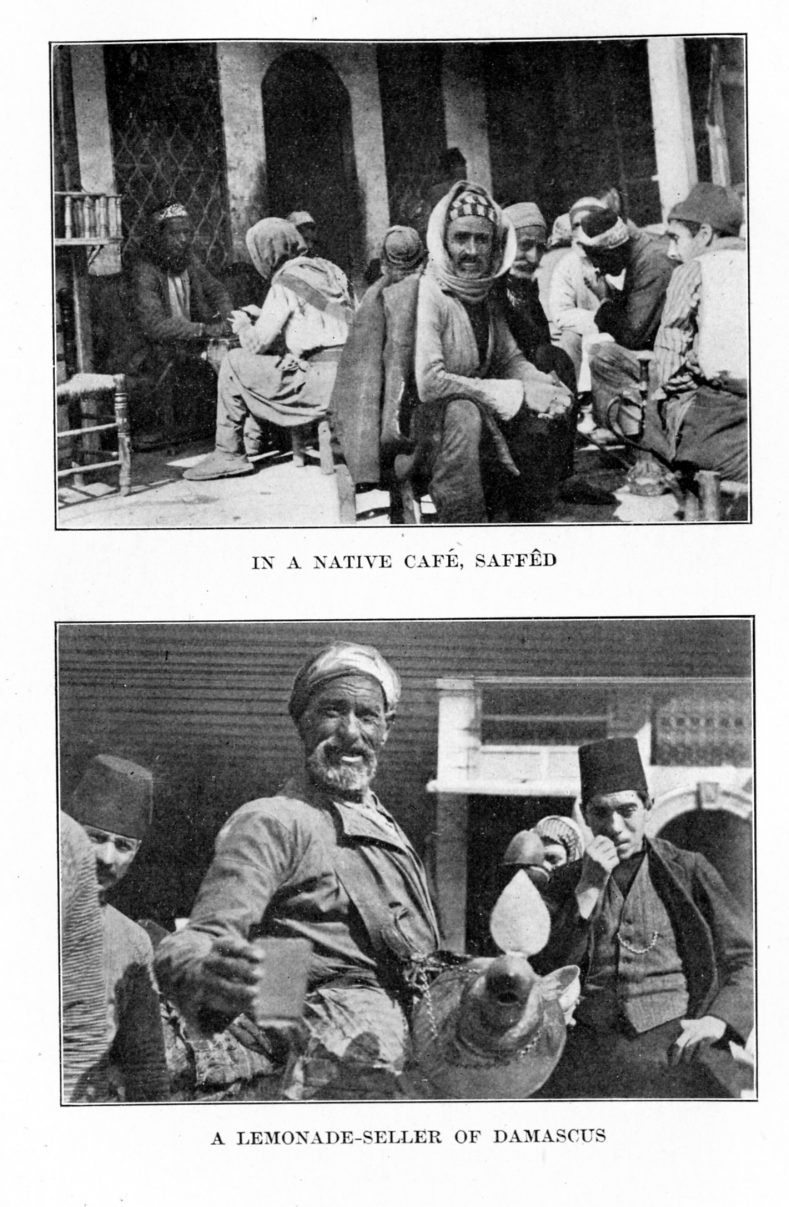 the Archive of World War 1 Photographs and Texts
the Archive of World War 1 Photographs and Texts

[ILLUSTRATION: HOUSE OF THE AUTHOR'S FATHER, EPHRAIM FISHL AARONSOHN, IN ZICRON-JACOB]
![HOUSE OF THE AUTHOR'S FATHER, EPHRAIM FISHL AARONSOHN, IN ZICRON-JACOB]](images/img07.png)
My father, an old man, knew nothing of what had happened, but the rest of my family were tremendously excited. I made light of the whole affair, but I felt sure that this was only the beginning. Sure enough, next morning--the Sabbath--the same officer returned and put three of the leading elders of the village, together with myself, under arrest. After another fruitless inquisition at the hotel, we were handcuffed and started on foot toward the prison, a day's journey away. As our little procession passed my home, my father, who was aged and feeble, came tottering forward to say good-bye to me. A soldier pushed him roughly back; he reeled, then fell full-length in the street before my eyes.
It was a dismal departure. We were driven through the streets shackled like criminals, and the women and children came out of the houses and watched us in silence--their heads bowed, tears running down their cheeks. They realized that for thirty-five years these old men, my comrades, had been struggling and suffering for their ideal--a regenerated Palestine; now, in the dusk of their life, it seemed as if all their hopes and dreams were coming to ruin. The oppressive tragedy of the situation settled down on me more and more heavily as the day wore on and heat and fatigue told on my companions. My feelings must have been written large on my face, for one of them, a fine-looking patriarch, tried to give me comfort by reminding me that we must not rely upon strength of arms, and that our spirit could never be broken, no matter how defenseless we were. Thus he, an old man, was encouraging me instead of receiving help from my youth and enthusiasm.
At last we arrived at the prison and were locked into separate cells. That same night we were tortured with the falagy, or bastinado. The victim of this horrible punishment is trussed up, arms and legs, and thrown on his knees; then, on the bare soles of his feet a pliant green rod is brought down with all the force of a soldier's arm. The pain is exquisite; blood leaps out at the first cut, and strong men usually faint after thirty or forty strokes. Strange to say, the worst part of it is not the blow itself, but the whistling of the rod through the air as it rushes to its mark. The groans of my older comrades, whose gasps and prayers I could hear through the walls of the cell, helped me bear the agony until unconsciousness mercifully came to the rescue.
For several days more we were kept in the prison, sick and broken with suffering. The second night, as I lay sleepless and desperate on the strip of dirty matting that served as bed, I heard a scratch-scratching at the grated slit of a window, and presently a slender stick was inserted into the cell. I went over and shook it; some one at the other end was holding it firm. And then, a curious whispering sound began to come from the end of the stick. I put my ear down, and caught the voice of one of the men from our village. He had taken a long bamboo pole, pierced the joints, and crept up behind a broken old wall close beneath my window. By means of this primitive telephone we talked as long as we dared. I assured him that we were still enduring, and urged him on no account to give up the arms to the Turkish authorities--not even if we had to make the ultimate sacrifice.
Finally, when it was found that torture and imprisonment would not make us yield our secret, the Turks resorted to the final test--the ordeal which we could not withstand. They announced that on a certain date a number of our young girls would be carried off and handed over to the officers, to be kept until the arms were disclosed. We knew that they were capable of carrying out this threat; we knew exactly what it meant. There was no alternative. The people of our village had nothing to do but dig up the treasured arms and, with broken hearts, hand them over to the authorities.
And so the terrible news was brought to us one morning that we were free. Personally, I felt much happier on the day I was put in prison than when I was released. I had often wondered how our people had been able to bear the rack and thumbscrew of the Spanish Inquisition; but when my turn and my comrades' came for torture, I realized that the same spirit that helped our ancestors was working in us also.
Now I knew that our suffering had been useless. Whenever the Turkish authorities wished, the horrors of the Armenian massacres would live again in Zicron-Jacob, and we should be powerless to raise a hand to protect ourselves. As we came limping home through the streets of our village, I caught sight of my own Smith & Wesson revolver in the hands of a mere boy of fifteen--the son of a well-known Arab outlaw. I realized then that the Turks had not only taken our weapons, but had distributed them among the natives in order to complete our humiliation. The blood rushed to my face. I started forward to take the revolver away from the boy, but one of the old men caught hold of my sleeve and held me back.
[ILLUSTRATION: IN A NATIVE CAFÉ, SAFFÊD/A LEMONADE-SELLER OF DAMASCUS]
